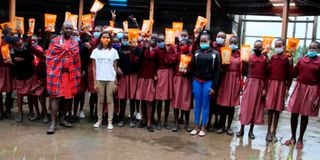Only 12 per cent of girls aged 12 to 19 years know about menses

Pupils of Mara Girls Leadership Primary School in Narok West Sub-county with Dr Madhvi Dalal (in white), a volunteer who educated them on menstrual health management and sexual reproductive health rights last February.
What you need to know:
- Reproductive health advocates say universal provision of comprehensive sexuality education could enable women and girls make informed decisions.
- New report recommends that all health facilities be equipped with health service providers trained on SRHR and a rollout of sexuality education for in and out of school adolescents.
Sexual and reproductive health and rights (SRHR) advocates have called on the government to offer comprehensive sexuality information to women and girls.
They argue that universal provision of comprehensive sexuality education could enable women and girls make informed decisions.
“Whereas government facilities provide information on some reproductive health services such as delivery and post-natal care, it failed to provide information on abortion care, post abortion care, assisted reproduction and contraceptives,” said Centre for Reproductive Rights (the Centre),advocacy advisor for Africa, Ms Betty Odallo.
She spoke during the virtual launch of a report on women and girls' access to SRHR information jointly done by the Centre and Trust for Indigenous Culture and Health (Ticah), last week.
“Learning institutions offer limited or no comprehensive education on sexual and reproductive health, yet school going girls prefer such information,” she added.
For Ticah Executive Director Jade Maina, the government must fulfil its commitments on provision of SRHR information and services.
“For Kenyan women and girls to realise healthy productive lives and contribute to nation building, the government must live to its commitments to Sustainable Development Goals and leave no one behind in designing sexual and reproductive health and rights programs,” she said.
Five counties
The report informed by survey of grassroots women and girls, health service providers, and government officials in the five counties of Nairobi, Bungoma, Homa Bay, Kericho and Kilifi counties, indicates concerning knowledge gaps.
It shows only 12 per cent of girls aged 12–19 and 38 per cent of women in 21–30 age bracket are knowledgeable about menstruation. While 36 per cent of women and girls aged below 25 have the least knowhow on reproductive rights.
Right to SRHR information and services is guaranteed in Articles 35 and 43 of the Constitution, a responsibility the advocates say the government is lax to deliver.
Article 35(1b) states that "Every citizen has the right of access to information held by another person and required for the exercise or protection of any right or fundamental freedom."
While Article 43(1a) is clear that "Every person has the right to the highest attainable standard of health, which includes the right to health care services, including reproductive health care."
The report recommends that all health facilities be equipped with health service providers trained on SRHR and a rollout of sexuality education for in and out of school adolescents.





